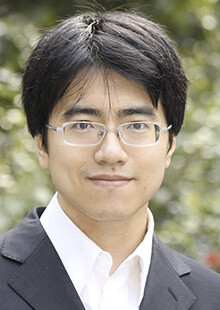Q&A: Professor Zhang on Comparative Legal History
Taisu Zhang ’08 received tenure and will be appointed Professor of Law at Yale Law School on July 1, 2019. He studies comparative legal history — specifically, economic institutions in modern China and early modern Western Europe — comparative law, property law, and contemporary Chinese Law. His first book, The Laws and Economics of Confucianism: Kinship and Property in Pre-Industrial China and England was published by Cambridge University Press in 2017. It has been awarded the Presidents Book Award from the Social Science History Association and the Gaddis Smith International Book Prize from the MacMillan Center for International and Area Studies for the best first book by a Yale ladder faculty member.
On the occasion of Zhang’s promotion, we asked him a few questions about his research and work at the Law School.
Q: Why/how did Chinese and English

TZ: I am about 1.7 books into a trilogy of books on this subject, so any answer I give now necessarily involves some conjecture and hypothesis. Nonetheless, my current opinion is that it had much to do with the relative cost of capital versus labor: China was a relatively labor-rich economy with relatively little capital accumulation, whereas England was the opposite. Given that most early industrial technologies required substantial economies of scale to be cost-efficient, they had a very difficult time taking off in China throughout the 19th and early 20th centuries, despite numerous attempts at kickstarting the industrialization process by the state. Now, previous scholarship has covered the labor cost side of this analysis in some detail, but this literature is logically incomplete, as many have pointed out, without a comparable account of capital accumulation costs — which is where my books make (or will make) their contribution.
I believe there are institutional/legal explanations for the relative lack of capital accumulation in the Chinese economy, and also that there are deeper cultural and ideological explanations for the institutional/legal phenomena. Each book in the trilogy will cover one part of this argument: book one looks at property rights and their sociocultural foundations, book two looks at the ideological origins of tax policy and the fiscal state, while book three examines corporate institutions, and then pulls all of this into a unified thesis.
Q: What are the implications we see today from these differences in development?
TZ: Given that a lack of capital accumulation was one of the primary culprits (both real and perceived) for China’s industrial underdevelopment prior to the creation of the People’s Republic in 1949, the new Communist state invested heavily in getting the economy over what you might call “the capital accumulation barrier.” As a result, it immediately began to confiscate land, centralize commercial assets, and spend heavily on infrastructure. To a large extent, these industrial policies laid the foundation for the state-centric mode of economic development that the contemporary Party-state continues to rely on even today. In that sense, the “China model” of development that we see today at least partially continues to be a response to the perceived weaknesses of the pre-1949 economy.
Q: Your book comes out of your Yale dissertation — how did it develop and change from then to now?
TZ: Well, the book (the first book, that is) is simply much longer — I added in at least 1.5 chapters worth of new material during revision, much of it in the way of theoretical clarification, but also quite a bit of new empirical material — and also heavily reorganized many of the chapters. That said, I had always tried to write the dissertation “as a book,” so there wasn’t as much or as painful a revision process as one sometimes sees in the transition from history dissertation to book. The major empirical arguments and theoretical insights stayed roughly the same from dissertation to book. It was largely the same project, just bulked up and more polished.
Q: What are some of your other research interests?
TZ: I’ve tried to maintain at least two strands of research on the side of my book projects, splitting time between them and the books roughly 30/70: I write occasionally on what one might call private law theory, with an emphasis on property; and also on the contemporary Chinese legal system and underlying currents in Chinese political and legal culture. The unifying theoretical theme behind these different strands of writing is a sustained interest in the interaction between “soft” factors like culture and ideology and “harder” phenomena like legal, institutional, and economic change. That kind of interdisciplinary theoretical inquiry is what has always drawn me to the intellectual life of the Yale Law School, which is about as perfect as a true and serious interdisciplinary hub for the law-related social sciences and humanities as one could possibly imagine.


